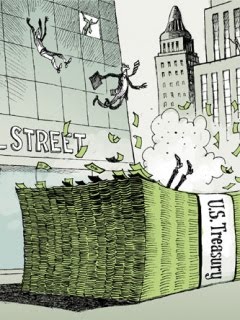Listed on London Stock Exchange:
BARC 308.90p +25.20p (+8.88%)
CAU 49.75p +1.50p (+3.11%)
CRWN 30.50p +0.50p (+1.67%)
FPER 5.13p +0.13p (+2.60%)
FCCN 41.50p +3.75p (+9.93%)
GAR 1.75p 0.00p (0.00%)
JKX 246.50p +15.70p (+6.80%)
LLOY 57.68p +4.15p (+7.75%)
LLPE 60.00p -0.50p (-0.83%)
MAI 158.50p 0.00p (0.00%)
QQ. 124.90p +4.90p (+4.08%)
RBS 47.26p +1.76p (+3.87%)
UNG 2.75p -0.25p (-8.33%)
Listed on New York Stock Exchange:
C $3.98 -$0.02 (-0.50%)
The markets went up due to euro guarantee plan and went down again as there are concerns that the austerity measures announced by a number of euro countries may affect economic recovery in the eurozone. UK bank stocks, including the ones I have shares in, are affected quite badly due to an inquiry by the Competition Commission regarding whether retail and investment banking parts should be split up. US banks, including Citigroup, are affected by financial reform bill proposals regarding the ban of banks from proprietary trading. At least my portfolio value went up since the good news outweighed the bad. My portfolio gain now stands at about 1.75%. I think the markets may be volatile for a little bit longer. It is going to be a fun ride going up and down. I am going to stay put and plan future purchases to further diversify my portfolio.
In my opinion, history may repeat itself over again. The last time this sort of economic crisis happened was the Great Depression which followed from the 1929 crash. The second Glass-Steagall Act (more formally The Banking Act of 1933) passed to separate retail and investment banking, prevented retail banks from performing investment banking functions. This ensured that depositors funds cannot be used for speculative purposes such as trading for the bank's own account and underwriting securities the issuer has trouble selling to existing shareholders. The Act, along with other measures such as New Deal and Federal Deposit Insurance Corporation, has aided economic recovery in the US. However, other countries did not implement similar laws and their economies recovered roughly at the same time as the US. I believe that limiting the risk the bank takes on and not using depositors' funds for risky activities may be more effective than separation of retail and investment banking parts. Combining investment banking and retail banking is not a bad concept in general. What makes it bad is the people who run them badly. Greed is part of human nature and until more appropriate measures are in place, crises of epic proportions such as this will ultimately happen again.






No comments:
Post a Comment